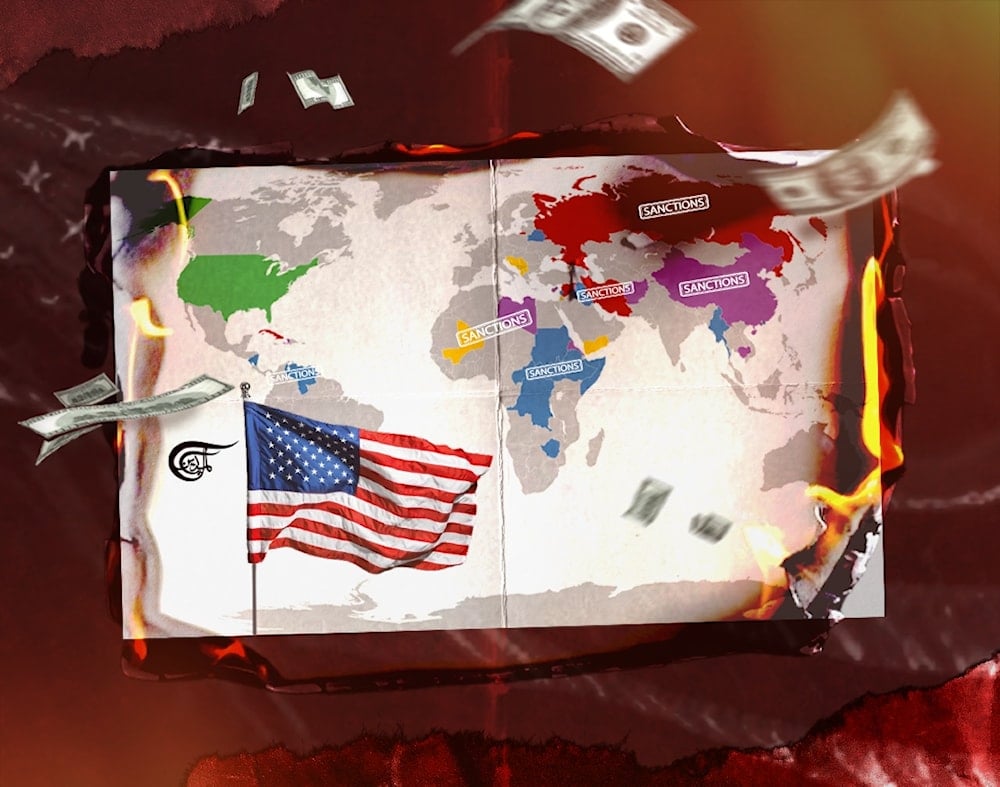Collapsing empire: The day sanctions died
By sanctioning so many countries so readily, the Empire has in effect sanctioned itself - and convinced an ever-increasing number of states to seek alternative economic and financial structures.
-

WaPo reports that the deleterious "overuse" of sanctions "is recognized at the highest levels" of the US government, and "concern about their impact has grown" in line with their use. (Al Mayadeen English; Illustrated by Zeinab El-Hajj)
On July 25th, Washington Post published a revelatory investigation into the US government’s excessive use and abuse of economic sanctions in recent years. It exposes in forensic detail how these measures "have become an almost reflexive weapon in perpetual economic warfare" against "enemy" states, individuals, organisations, and businesses the world over. However, in lock-step, ever-ratcheting overreliance on sanctions has begun to catastrophically backfire. Mainstream acknowledgement of this inconvenient truth is just the latest harbinger of the Empire’s rapidly looming demise.
Today, Washington "imposes three times as many sanctions as any other country or international body, targeting a third of all nations with some kind of financial penalty," WaPo notes. The US is "imposing sanctions at a record-setting pace again this year, with more than 60 percent of all low-income countries now under some form of financial penalty." Both Democrat and Republican administrations find sanctions "increasingly irresistible." Along the way, their international allies have become equally drunk on the supposed potency of sanctions.
"The mentality, almost a weird reflex, in Washington has just become: If something bad happens, anywhere in the world, the US is going to sanction some people," Ben Rhodes, Barack Obama’s deputy national security adviser, told WaPo. "It is the only thing between diplomacy and war and as such has become the most important foreign policy tool in the US arsenal," a DC-based think tank apparatchik echoed. But, they added, "nobody in government is sure this whole strategy is even working."
Accordingly, WaPo reports that the deleterious "overuse" of sanctions "is recognized at the highest levels" of the US government, and "concern about their impact has grown" in line with their use. "Some senior administration officials have told President Biden directly that overuse of sanctions risks making the tool less valuable." Yet, US officials still can’t seem to kick their sanctions habit, "[tending] to see each individual action as justified, making it hard to stop the trend."
Like a longtime junkie endlessly chasing the dragon, the Empire is evidently trapped in a toxic cycle, from which it cannot escape. As WaPo notes, "by cutting their targets off from the Western financial system," for decades sanctions could "crush national industries, erase personal fortunes and upset the balance of political power in troublesome regimes - all without putting a single American soldier in harm’s way." Now that superpower is all used up, and will never return.
‘Sanctioned Party’
While US leaders have been sanctioning their adversaries since the country’s 1776 founding, Iraq’s 1990 invasion of Kuwait "gave rise to a new form of the weapon." Baghdad was immediately subject to a total international blockade, making exporting oil - its primary source of revenue - and importing even basic supplies all but impossible. Following the Gulf War, with the country’s decimated infrastructure incapable of being rebuilt, hunger and preventable diseases spread like wildfire. A 1991 UN report described conditions locally as "near-apocalyptic" and "pre-industrial".
Those sanctions remained in place against Baghdad until the illegal 2003 Anglo-American invasion. Asked in 1996 whether the estimated half a million Iraqi children killed by sanctions was "worth it", then-Secretary of State Madeleine Albright replied in the affirmative. It was that year sanctions on Yugoslavia imposed in May 1992 were lifted. At one point producing inflation of 5.578 quintillion percent, drug addiction, alcoholism and suicides skyrocketed, shortages of everything were constant, innocent civilians died needlessly, and Belgrade’s once thriving independent industry was crippled.
As WaPo records, following the Soviet Union’s 1991 collapse, the US became the world’s "unrivaled superpower." Governments and banks around the world were dependent on the US dollar, which is still still the world’s dominant currency. The greenback "undergirds international trade even when there is no connection to an American bank or business." Today, most major commodities, such as oil, remain priced globally in dollars. Countries trading in their own currencies rely on dollars to complete international transactions.
This makes the US Treasury "the gatekeeper to the world’s banking operations" - "and sanctions are the gate." Treasury officials "can impose sanctions on any foreign person, firm or government they deem to be a threat to the US economy, foreign policy or national security." Targets needn’t be accused much less convicted "of a specific crime." Once sanctions are applied, it immediately becomes "a crime to transact with the sanctioned party." Growth of sanctions has been exponential over the past three-and-a-half decades. WaPo reports:
"As recently as the 1990s, the Treasury Department’s Office of Foreign Assets Control (OFAC) was responsible for implementing just a handful of sanctions programs. Its staff fit comfortably in a single conference room. One of its major responsibilities was blocking American sales of Cuban cigars."
Following 9/11, the Empire’s penchant for sanctions became a full-blown addiction. A decade later, WaPo reveals, the US sanctions business was booming to such a degree that OFAC’s then-director Adam Szubin performed a rousing ditty, "Every Little Thing We Do Is Sanctions", set to the tune of "Every Little Thing She Does Is Magic" by The Police, at a staff party in a DC hotel. Hallucinatory and dystopian barely covers it.
While President, Donald Trump "used sanctions for retribution in ways never conceived." This included, for example, sanctioning "officials with the International Criminal Court after it opened a war crimes investigation into the behavior of US troops in Afghanistan." Such was the inexorable sanctions drive, Caleb McCarry, State Department lead on Cuba policy during George W. Bush’s administration, testifies that even Treasury staff began craving:
"Relief from this relentless, never-ending, you-must-sanction-everybody-and-their-sister, sometimes literally, system."
McCarry believes sanctions are "way, way overused, and it’s become out of control." This view is, per WaPo, widespread in US imperial halls of power. The outlet reports, "by the time of Biden's inauguration, a consensus had emerged among his transition team that something had to change." So it was in the summer of 2021, "five Treasury staffers worked up an internal draft proposing to restructure the sanctions system." It ran to "roughly 40 pages", and "represented the most substantial revamp of sanctions policy in decades."
However, just like the Bush, Obama, and Trump administrations, "Biden’s team found the power difficult to give up." Treasury insiders tell WaPo that they witnessed "their bosses take out key parts of their plan." The finished product - "2021 Sanctions Review" - was released in October that year. Reduced to just eight pages in length, it "contained the earlier document’s most toothless recommendations." Thereafter, the Biden administration went on a sanctions rampage, penalising targets including:
"Israeli settlers in the West Bank, former government officials in Afghanistan, alleged fentanyl dealers in Mexico, and a North Macedonian spyware company."
Meanwhile, sanctions Biden actively promised to ease, such as punitive measures applied to Cuba by Trump, "were largely maintained under pressure from Capitol Hill, despite the view among top administration officials that the embargo is counterproductive and a failure."
‘Closer Alliance’
Following the beginning of the war in Ukraine in February 2022, senior government officials across the West spoke a bombastic game about the future impact of sanctions they were preparing in response. French Finance Minister Bruno Le Maire boasted, "We are waging an all-out economic and financial war on Russia…We will cause the collapse of the Russian economy." German Chancellor Olaf Scholz spoke of an epochal Zeitenwende - turning point - that would erect a permanent international cultural, financial, and political Iron Curtain around Vladimir Putin’s pariah state.
To say the least, this braggadocio hasn’t aged well. As the mainstream media is now frequently forced to admit, Western sanctions on Moscow not only failed to produce universally forecast economic devastation, but revitalised domestic industry and increased wages for average citizens. In May, The Spectator begrudgingly observed, "Russians are spending more on restaurants, white goods, and even property - they’ve never had it so good." Meanwhile, Europe, electively cut off from the country’s cheap energy supplies due to those sanctions, is deindustrialising at rapacious speed.
WaPo glides over this embarrassing boomerang by claiming, "two years of sanctions on Russia over its invasion of Ukraine have degraded Moscow’s long-term economic prospects and raised the costs of military production." Still, the outlet concedes these measures have brought "the Kremlin into closer alliance with Beijing," offsetting negative consequences. Markedly, an accompanying graphic grading "US global sanctions by impact" from "low" to "high", based on "severity of sanctions by country and year sanctions began", makes no mention of the 2022 anti-Russian sanctions at all.
Moreover, WaPo admits, "North Korea has been sanctioned for more than a half-century without halting Pyongyang’s efforts to acquire nuclear weapons and intercontinental ballistic missiles." Similarly, "sanctions on Nicaragua have done little to deter" the anti-Western government of President Daniel Ortega. Most significantly of all, WaPo laments, "a more existential challenge emerged." Originally, the "power of sanctions lay in denying foreign actors access to the dollar" - "but if sanctions make it risky to depend on dollars, nations may find other ways to trade."
And here we learn the WaPo investigation’s propaganda purpose. By sanctioning so many countries so readily, the Empire has in effect sanctioned itself - and convinced an ever-increasing number of states to seek alternative economic and financial structures. Since February 2022, China AND Russia have been hard at work constructing those alternatives. The effects have been so revolutionary that the Wall Street Journal has spoken of an "Axis of Evasion". This is an international trading structure from which the US is excluded. But the pair’s close allies - particularly members of the BRICS alliance - want in immediately.

 Kit Klarenberg
Kit Klarenberg
 9 Min Read
9 Min Read











